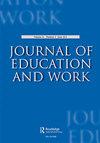收入和自雇机会对过度教育的影响:来自2002-2016年美国劳动力市场职业的证据
IF 1.7
Q2 EDUCATION & EDUCATIONAL RESEARCH
引用次数: 0
摘要
本文是对美国劳动力市场数据的应用计量经济学分析。我们研究了几个因素对受教育程度过高的员工进入不同工作类别的影响。我们使用固定和随机效应的面板数据回归分析。我们还使用数据可视化来调查2002-2016年各种职业类别的过度教育趋势。我们的数据集由704个职业的7组年度数据组成。我们从两个层面调查了这一现象:1)大学毕业生涌入不需要大学学位的职业,以及2)硕士和博士学位持有者涌入需要学士学位或更低学位的职业。我们观察到,大多数职业的过度教育都在增加,这造成了挤出效应;一个受过充分教育的工人可能会被一个受过过度教育的工人打败。虽然大学教育的收入溢价随着时间的推移而下降,但大学教育相对于高中学位的收入优势一直存在。此外,我们的回归分析表明,过度教育比例与职业的中位数收入及其自雇机会呈正相关。这一结果适用于大学毕业生和研究生学位持有者。本文章由计算机程序翻译,如有差异,请以英文原文为准。
Impact of earnings and self-employment opportunities on overeducation: evidence from occupations in the United States labor market 2002-2016
ABSTRACT This is an applied econometric analysis of labour market data for the United States. We study the impact of several factors on overflow of overeducated employees into various job categories. We use panel data regression analysis with fixed and random effects. We also use data visualisation to investigate the overeducation trends during 2002–2016 for various occupation categories. Our dataset consists of seven sets of annual data for 704 occupations. We investigate this phenomenon at two levels: 1) overflow of university graduates into occupations that do not require a university degree, and 2) overflow of Masters and PhD degree holders into occupations that require a bachelor’s degree or less. We observe that the overeducation has increased in most occupations and it causes a crowding out effect; an adequately educated worker might be outcompeted by an overeducated worker. While the income premium of a university education has decreased over time, the income advantage of university education over a high school degree has persisted. Furthermore, our regression analysis has shown that the overeducation ratio has a positive correlation with the median earnings of an occupation and its opportunities for self-employment. The results hold for both college graduates and holders of graduate degrees.
求助全文
通过发布文献求助,成功后即可免费获取论文全文。
去求助
来源期刊

Journal of Education and Work
EDUCATION & EDUCATIONAL RESEARCH-
CiteScore
2.70
自引率
14.30%
发文量
40
期刊介绍:
The Journal of Education and Work is an international forum for academic research and policy analysis which focuses on the interplay of the education and economic systems. The journal examines how knowledge, skills, values and attitudes both about and for work and employment are developed within the education system. The journal also explores the various forms of industrial training and accreditation in the economic system, including changes in the economic and industrial infrastructure which influence the type of employees required. Work in the informal economy is also included.
 求助内容:
求助内容: 应助结果提醒方式:
应助结果提醒方式:


